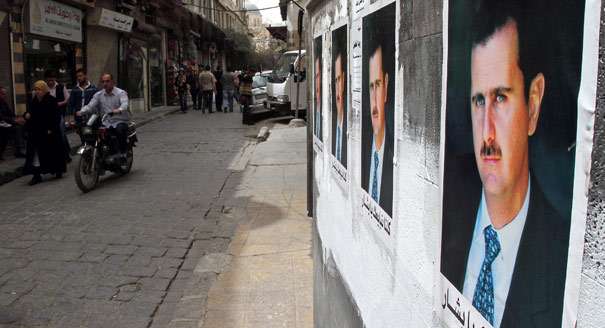On June 3, 2014, Syrian President Bashar al-Assad looks forward to securing a new seven-year presidential term in a sham election conducted in the shadow of regime violence. A key objective for Assad in his third term is consolidating his “counterterrorism” campaign—in other words, presenting his crackdown on Syrian opposition groups as a fight against jihadism. In doing so, Assad is betting on the eventual support of, or at least coordination with, the international community in this new “war on terror,” which would secure his position in power. Although Western countries have called the June 3 election a “parody,” Assad’s bet is not too far-fetched. The Egyptian case shows why.
The international community’s reaction to the Egyptian election that took place in late May 2014 has been one of bewilderment but also—crucially—acceptance. This acceptance goes as far back as summer of 2013, when the United States deliberately refrained from labeling the ouster of former president Mohamed Morsi a coup so as to continue its aid to—and cordial relations with—Egypt. In applying this selective framework, the United States paved the way for the Egyptian presidential election to take place as if it were truly fair and free. This acceptance continues despite the déjà vu of General Abdel Fattah el-Sisi’s 93.3 percent majority vote and the government’s massive crackdown on the Muslim Brotherhood and other opposition groups.
The Egyptian scenario shows that the security agenda (in this case, maintaining the Camp David peace accords with Israel and countering terrorist activity in Sinai) can overshadow human rights infringements. The Egyptian government is using terrorism as a pretext to arrest and execute hundreds of opposition figures, despite the role its own hardline actions against the Brotherhood is playing in the rise of extremism. The global silence that has accompanied those oppressive actions has been an implicit acquiescence by the West.
Syria has a somewhat parallel security scenario—albeit on a much more immense scale—that Assad seeks to exploit in his quest for legitimacy and longevity. The regime’s violent crackdown on the opposition has contributed to the creation of a jihadist problem in Syria that is heading towards becoming a global concern, which Assad is using to suppress all opposition groups under an anti-terrorism umbrella while trying to sell his actions as a legitimate fight against terrorism. It would not be surprising for Assad to be looking at Egypt for a set-up that would offer him reassurance vis-à-vis the West.
The lesson provided by the Egyptian election is clear. Selective frameworks by the international community send the message that its actions and decisions are not based on values but on self-interest—all can be forgiven for the sake of security. Following the June 3 election, Assad will continue to allow groups like the jihadi group Islamic State of Iraq and the Levant to operate in order to emphasize that terrorism is a shared interest for Syria and the West. He is likely to increase cooperation on the destruction of chemical weapons to show the international community that he can be trusted. He will in the meantime try to position himself as a reliable international counterterrorism partner.
How the West reacts to the Syrian election sends important signals to Assad. It is crucial for the international community not to repeat the same, ongoing mistake of the Egyptian scenario. So far, condemnation of the Syrian election has not gone far beyond the level of rhetoric. The West needs to act urgently and decisively to break the cycle of hypocrisy that has allowed numerous Arab dictators to continue oppressing their own people by positioning of themselves as Western security allies.






